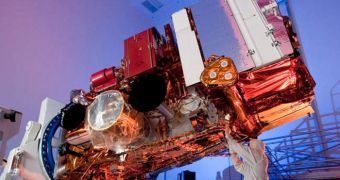Congress has recently been asked to increase fundings for the planned Joint Polar Satellite System (JPSS) mission to Earth's orbit. NASA and the US National Oceanic and Atmospheric Administration (NOAA) want to build the new civilian weather satellite for studying global warming and related issues.
At this point, lawmakers are working on a budget measure that would see spendings associated with all federal programs being kept to 2010 levels in 2010. But the White House is asking Congress for a significant boost in JPSS funding for next year.
Government and industry sources say that the mission is a replacement of sorts for the joint civil-military National Polar-orbiting Operational Environmental Satellite System (NPOESS) initiative, which was stopped dead in its track this February.
The White House was the architect of NPOESS' downfall, but even President Barack Obama most likely acknowledged the need for such a mission.
As such, the American space agency was instructed to develop the JPSS for NOAA, as a civilian application, while scientists at the US Air Force (USAF) are designing and building their own weather satellite.
Since the new fiscal year began on October 1, the US federal government has been operating with continuing resolutions, which are stopgap measures designed to maintain funding levels at at least 2010 level. This happens because Congress proved incapable of passing any spending bills for next year.
According to space, a continuing resolution proposal that the House of Representatives could get will call for $528 million in additional funds to be alloted for the Joint Polar Satellite System (JPSS) mission.
Even though the new satellite will be using technologies developed under the NPOESS satellite program, NOAA still requested some $1.06 billion in funding for this mission alone for 2011.
If Congress does not make the necessary appropriations, then JPSS will only receive $382 million, which is utterly insufficient for developing the satellite.
In the document the White House Office of Management and Budget sent to Congress, experts highlight that the JPSS satellite needs to get an extra $528 million in 2011, thus reaching $910 million.
While this particular project may get funded after all, things are not looking at all bright for other, equally-important projects, that are currently plagued by lack of NASA funding, Space reports.

 14 DAY TRIAL //
14 DAY TRIAL //